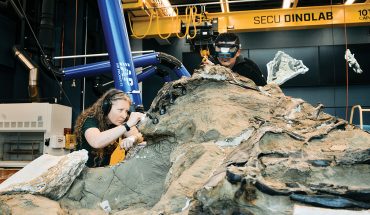“This part of North Carolina really has been one of the most dynamic areas in the nation in terms of growth and diversification.”
–Congressman David Price
by Mimi Montgomery
Washington, D.C., is only a four-and-a-half hour drive from Raleigh, but when you’re just a regular Joe, federal government and the politicians who run it can seem light- years away.
You probably know Congressman David Price as the representative of the Fourth Congressional District, which consists of parts of Wake, Durham, and Orange counties. Price is not light- years away: He is a long-time Chapel Hill resident, an avid gardener who likes to frequent Raleigh to see performances by the North Carolina Symphony. While he spends most of his weeks in Washington, the former UNC Morehead-Cain scholar’s home is really in the Triangle, he says, and he returns here most weekends.
He’s got it down to a science – he has been in office since 1987, after all. Each weekend, after the last Congressional votes are held, Price leaves Capitol Hill to make the flight to RDU or the drive down I-95. He has a favorite home-cooked restaurant where he likes to stop for a bite to eat just outside Petersburg, but he’s still holding out for the day there’s a quick train between Raleigh and Washington, he says.
He’s holding out hope sincerely, because he has had a front-row seat to watching this region transform. Even though he has deep ties to the Triangle area, Price was born in Erwin, Tennessee, “a small town about six miles as the crow flies from the North Carolina line,” he says. Despite being student body president in high school, Price says he didn’t know what he wanted to be when he grew up. Spurred on by the Sputnik obsession of the Cold War era, he thought he might want to be an engineer, and crossed the border to attend Mars Hill College, then a two-year junior college.
He continued on to UNC-Chapel Hill, where he says his political inclinations began to take shape. Because of his Mars Hill ties, Price was elected president of the Baptist Student Union, and helped to integrate Chapel Hill restaurants and movie theaters during the Civil Rights movement.
Price says he’s thankful he came of age during that time: Despite the turmoil of the mid-1960s, the decade’s political activism and progressiveness shaped the platforms he’d eventually use in office.“It changed my religious outlook, my political outlook,” Price says of working with the Civil Rights movement. “This was a moment when we needed politics, we needed government. And we made it work in this country. In retrospect, it was a remarkable time.”
Working with the movement solidified Price’s interest in ethics and social action, and he decided to go to Yale Divinity School. He eventually received his Ph.D. in political science from Yale, too, and taught there for several years.
When the offer came to join Duke’s political science faculty in the early ’70s, Price knew it was time to head back to North Carolina.
Price worked in Durham, but chose to settle once again in Chapel Hill. Both his children went to the public schools there, and Lisa is on the board of the public library and helped establish North Carolinians Against Gun Violence. Price’s own ethical interests came into play when he was asked to help found the university’s Sanford School of Public Policy, where he developed its ethical curriculum.
Price finally took the political plunge when he was elected to the House of Representatives over 30 years ago. The Triangle area that Price represented then is much different than the one he does now. His district originally consisted of all of Randolph, Chatham, Orange, Wake, and Franklin counties; today, due to booming growth in the area, Wake alone has a greater population than one congressional district (hence why Price now represents only part of it).
It’s not just the numbers that have changed, either, Price says – it’s evolved in ideals and character, too. “When I first came to North Carolina, there was maybe one Chinese restaurant and that’s it.” He adds that as a new Duke professor, he had a hard time convincing folks to relocate from other university towns to teach in the Triangle. Now Price’s constituents range from Nepali immigrants to Sri Lankans, and his district tops out at almost 800,000 people.
The Triangle is not such a hard sell anymore, he says. “The area is always growing, and is much different from the rest of North Carolina in terms of economic and ethnic diversity,” he says. “You can see this in the political ebb and flow of my electoral history, but this part of North Carolina really has been one of the most dynamic areas in the nation in terms of growth and diversification.”
Growth and numbers aside, given Price’s long-time ethical interests, there’s one moral dilemma that plagues him: As a UNC grad and former Duke faculty member, who does he cheer for when the two meet on Tobacco Road?
Like a true politician, he deftly maneuvers away from the question. “I’ll keep my head down,” he says with a laugh.
“My loyalties are divided.”




